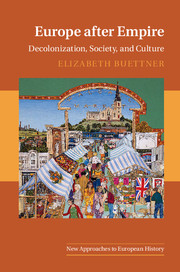Book contents
- Frontmatter
- Contents
- List of figures
- Acknowledgements
- Introduction
- Part I Decolonization for colonizers: Europe's transition to the postcolonial era
- 1 Myths of continuity and European exceptionalism: Britain, decolonization, and the Commonwealth family ideal
- 2 Occupation, resistance, and liberation: the road to Dutch decolonization
- 3 Soldiering on in the shadow of war: decolonizing la plus grande France
- 4 Long live the king? Belgium, the monarchy, and the Congo between the Second World War and the decolonization years
- 5 From rose-coloured map to Carnation Revolution: Portugal's overseas amputations
- Part II Migrations and multiculturalisms in postcolonial Europe
- Part III Memories, legacies, and further directions
- Epilogue: thoughts towards new histories of contemporary Europe
- Bibliography
- Index
3 - Soldiering on in the shadow of war: decolonizing la plus grande France
from Part I - Decolonization for colonizers: Europe's transition to the postcolonial era
Published online by Cambridge University Press: 05 June 2016
- Frontmatter
- Contents
- List of figures
- Acknowledgements
- Introduction
- Part I Decolonization for colonizers: Europe's transition to the postcolonial era
- 1 Myths of continuity and European exceptionalism: Britain, decolonization, and the Commonwealth family ideal
- 2 Occupation, resistance, and liberation: the road to Dutch decolonization
- 3 Soldiering on in the shadow of war: decolonizing la plus grande France
- 4 Long live the king? Belgium, the monarchy, and the Congo between the Second World War and the decolonization years
- 5 From rose-coloured map to Carnation Revolution: Portugal's overseas amputations
- Part II Migrations and multiculturalisms in postcolonial Europe
- Part III Memories, legacies, and further directions
- Epilogue: thoughts towards new histories of contemporary Europe
- Bibliography
- Index
Summary
‘All men are created equal; they are endowed by their Creator with certain inalienable Rights; among these are Life, Liberty, and the pursuit of Happiness.’ Standing before his supporters in Hanoi on 2 September 1945, Ho Chi Minh delivered a Declaration of Independence of the Democratic Republic of Vietnam whose opening words invoked the United States’ Declaration of Independence from Britain of 1776. But his focus immediately shifted to the revolutionary ideology of France, which had gradually assumed control over Vietnam's three component territories of Tonkin, Annam, and Cochin China starting in the 1850s. ‘The Declaration of the French Revolution made in 1791 on the Rights of Man and Citizen also states: “All men are born free and with equal rights, and must always remain free and have equal rights”’, he continued. But the French systematically denied to their colonial subjects what they had claimed for themselves starting in 1789. For the better part of a century, ‘the French imperialists, abusing the standard of Liberty, Equality, and Fraternity, have violated our Fatherland and oppressed our fellow citizens. They have acted contrary to the ideals of humanity and justice’, Ho insisted. As colonizers, the French had long withheld democratic political liberties from the Vietnamese, blocked their national unity, and ‘built more prisons than schools’. Economically, they ‘robbed us of our rice fields, our mines, our forests, and our raw materials’, dominated the financial and export sectors, extracted extortionate taxes that impoverished the Vietnamese peasantry, and exploited workers. Dismissing France's claims to and policies in Vietnam as a hypocritical affront to its own revolutionary national pedigree all along, Ho simultaneously declared independence and insisted that as far as France was concerned Vietnam was already free. Japan's occupation of much of Southeast Asia during the Second World War had effectively dissolved French authority; Japan's surrender opened up a power vacuum comparable to that Sukarno stepped into in Indonesia that allowed the Viet Minh – the nationalist front Ho spearheaded – to seize the reins. If the Japanese had begun the process of removing the French, the Viet Minh completed it during the August Revolution of 1945. ‘The truth is’, Ho emphasized, ‘we have wrested our independence from the Japanese and not from the French’; by 2 September, French rule was already history.
- Type
- Chapter
- Information
- Europe after EmpireDecolonization, Society, and Culture, pp. 106 - 162Publisher: Cambridge University PressPrint publication year: 2016

